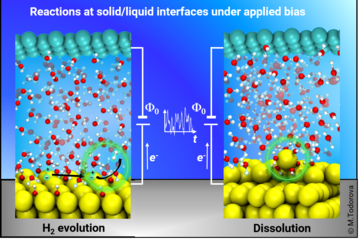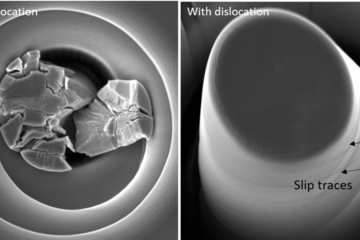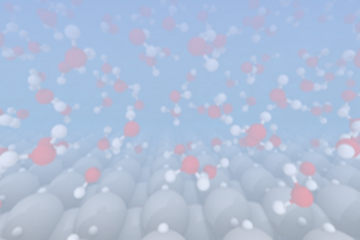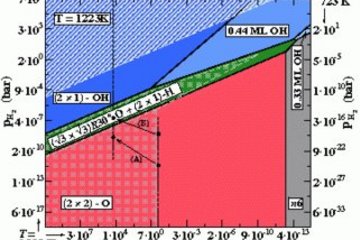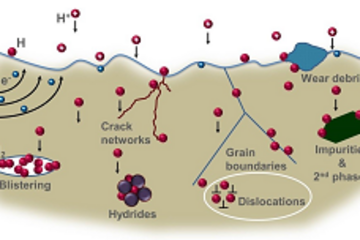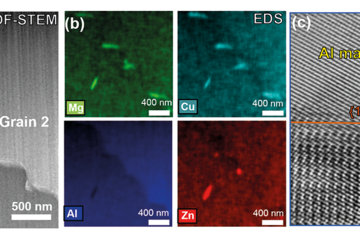All genres
1.
Journal Article
Role of oxygen in phase stability and mechanical behavior of the bcc HfNbTaTiZr high-entropy alloy during aging. Acta Materialia 298, 121400 (2025)
2.
Journal Article
Linking Composition, Structure and Thickness of CoOOH layers to Oxygen Evolution Reaction Activity by Correlative Microscopy. Angewandte Chemie International Edition 62 (28), e202305982 (2023)
3.
Journal Article
Atomic-Scale Insights into Morphological, Structural, and Compositional Evolution of CoOOH during Oxygen Evolution Reaction. ACS Catalysis 13 (2), pp. 1400 - 1411 (2023)
4.
Journal Article
Atom probe tomography. Nature reviews: Methods primers 1, 51 (2021)
5.
Journal Article
Revisiting o phase embrittlement in metastable b titanium alloys: Role of elemental partitioning. Scripta Materialia 193, pp. 38 - 42 (2021)
6.
Journal Article
Stabilization of an iridium oxygen evolution catalyst by titanium oxides. Journal of Physics: Energy 3, 034006 (2020)
7.
Journal Article
Chemical boundary engineering: A new route toward lean, ultrastrong yet ductile steels. Science Advances 6 (13), eaay1430 (2020)
8.
Journal Article
Defect Segregation and Its Effect on the Photoelectrochemical Properties of Ti-Doped Hematite Photoanodes for Solar Water Splitting. Chemistry of Materials 32 (3), pp. 1031 - 1040 (2020)
9.
Journal Article
Composition of the nanosized orthorhombic O′ phase and its direct transformation to fine α during ageing in metastable β-Ti alloys. Scripta Materialia 170, pp. 183 - 188 (2019)
10.
Journal Article
Degradation of iridium oxides via oxygen evolution from the lattice: correlating atomic scale structure with reaction mechanisms. Energy & Environmental Science 12, pp. 3548 - 3555 (2019)
11.
Journal Article
ω phase acts as a switch between dislocation channeling and joint twinning- and transformation-induced plasticity in a metastable β titanium alloy. Acta Materialia 151, pp. 67 - 77 (2018)
12.
Journal Article
Characterizing solute hydrogen and hydrides in pure and alloyed titanium at the atomic scale. Acta Materialia 150, pp. 273 - 280 (2018)
13.
Journal Article
Atomic-scale insights into surface species of electrocatalysts in three dimensions. Nature Catalysis 1 (4), pp. 300 - 305 (2018)
14.
Journal Article
Why Tin‐Doping Enhances the Efficiency of Hematite Photoanodes for Water Splitting - The Full Picture. Advanced Functional Materials 28 (52), 1804472 (2018)
15.
Talk
Sub-nanometer microanalysis on hematite photoanodes with localized Sn dopants to enhance photocatalytic water splitting. 13th Multinational Congress on Microscopy, Rovinj, Croatia (2017)
16.
Poster
Microstructure characterization on electrodes and catalysts. Chinese-German Chemical Association (CGCA) 30th Annual Conference, Berlin, Germany (2018)
17.
Poster
Unravelling the identity of (Cu1+,Cu2+)xOy surface oxides formed under ethylene epoxidation conditions on AgCu catalysts. 1st IMPRS – RECHARGE SCIENTIFIC SYMPOSIUM 2017, University Duisburg-Essen, Essen, Germany (2017)
18.
Poster
Mapping of Sn dopant in hematite photoanodes by STEM-EELS and atom probe tomography. EDGE 2017: Enhanced Data Generated by Electrons, 8th International Workshop on Electron Energy Loss Spectroscopy and Related Techniques, Okuma, Okinawa, Japan (2017)
19.
Thesis - PhD
Advancements in the understanding of Ir-based water splitting catalysts at the near-atomic scale. Dissertation, Ruhr-Universität Bochum (2021)




